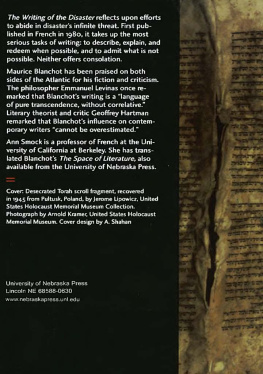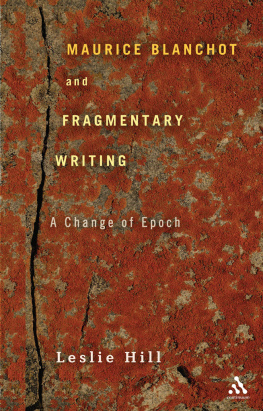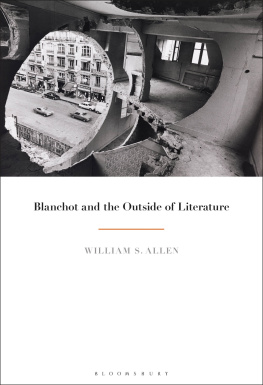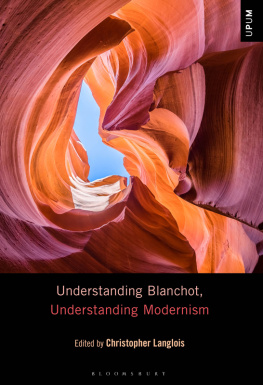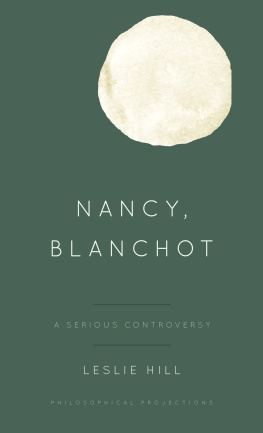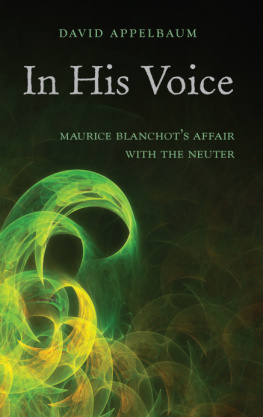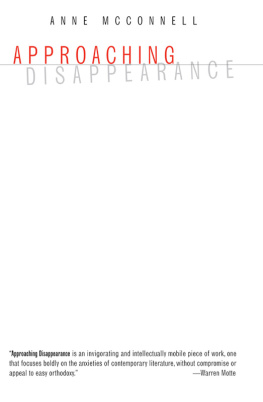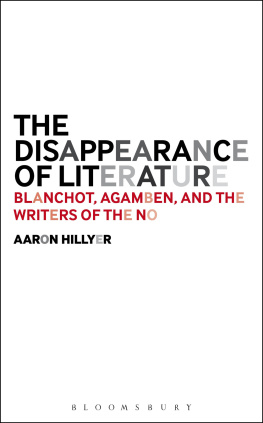
First paperback printing
of the new edition: 1995
ditions Gallimard, 1980
Copyright 1986, 1995 by the
University of Nebraska Press
All rights reserved
The paper in this book meets the guidelines for permanence and durability of the Committee on Production Guidelines for Book Longevity of the Council on Library Resources. Library of Congress Cataloging in Publication data appears on the last printed page of this book.
An index has been added to the New Edition.
Library of Congress Cataloging-in-Publication Data
Blanchot, Maurice.
[Ecriture du desastre. English]
The writing of the disaster = Lecriture du
desastre / by Maurice Blanchot;
translated by Ann Smock,
p. cm.
Includes bibliographical references and index.
ISBN 0-8032-6120-9
ISBN 978-0-8032-7747-2 (epub)
ISBN 978-0-8032-7748-9 (mobi)
1. Blanchot, MauricePhilosophy.
2. LiteraturePhilosophy.
I. Smock, Ann, 1944-
II. Title. III. Title:
Ecriture du desastre.
PQ2603. L3343E2813 1995
848.91207dc20 94-46856 CIP
The publisher does not have any control over and does not assume any responsibility for author or third-party websites or their content.
Translators Remarks
I have encountered two kinds of difficulty in translating this book. First, there is the kind posed by the fact that, here more than in previous works, Blanchot lets thoughts suggest themselves and develop, through puns, alliterations, rhymes, etymologies (both learned and fanciful), as though thought were engraved in words themselves and thinking consisted in deciphering the inscription, or as if language were speaking to us in the various sonorities of diverse terms, and we had only to listen to what it tellsin short, as if he believed language to be the reserve and preserve of truth (language, the house of being). Irony, to be sure, does not fail him with respect to this faith in language (irony is an important word, and effect, in The Writing of the Disaster) . Indeed, as though he had only to read out the lesson in irony from the words of his own language, he says of trust in language ( confiance) that it is dfiance distrust, nay defiance. Defiance of language, situated in language, which finds within itself the terms of its own critique. Or, he attributes the crypticness of languageits way of concealing and conserving meaningto the crypts within it, the recesses where inside is out and thus cannot be brought out (where the secret, all exposed, cannot be discovered). Such effects (confiance-dfiance , or cryptique-crypte-indcryptable) are often hard to reproduce. Sometimes I have had recourse to a footnote or to a snatch of the original between brackets in the body of the text.
The second kind of difficulty I want to mention (often, of course, the two kinds are intertwined) comes up when the expression in question is a proper name, or has a cognate in English, or is a perfectly ordinary expression whose equally ordinary equivalent in English comes to mind automatically. Examples: le multiple, le dsastre, lcriture du dsastre , Auschwitz, le silence. For though you can write down the multiple, the disaster, and so on, with some assurance, you have to learn from the whole book what these words could possibly mean, or what it could possibly mean that they be written. The following remarks are intended to suggest what I have come to understand by a few of the English words that I have written down here. I choose these few because each seems to me key.
(The translation is infinite. And yet it is necessary that we find the key word that opens and does not open.)
1. Readers of Death Sentence might associate the disaster with the title of that narrative: with the ultimatum that bears upon the ultimate, the stop put to the coming of that stop. I call disaster, Blanchot says, that which does not have the ultimate for a limit, but bears the ultimate away in the disaster.
2. The writing of the disaster is one among several similar expressions: the thought of the disaster, for example, knowledge of the disaster, and also the flight of thought, the interruption of the incessant. Of this last expression Blanchot comments that interruption and incessant mean the same thing. Such sameness is among the obsessions of this book, and it is the same as this obsession: the Other.
Blanchot stresses the reversibility of all expressions of the type theof, adding that they cannot be turned around. He writes: Desire of writing, writing of desire. Desire of knowledge, knowledge of desire. Let us not believe that we have said anything at all with these reversals. Such expressions have a motionless instability. They reverse, turn back, re-turn without cease, but as though it were ceaselessly that they reached a point of no return. The interruption of the incessant does not simply mean an intervention arresting the heretofore continuous; it also means the interruption that the incessant introducesthe break which the uninterrupted, the unbroken, is. The break in what? In interruption, in the very possibility of a break? Such an interruptionbut none, on account of this interruption, is possibleis the interruption of the incessant.
Similarly: the writing of the disaster means not simply the process whereby something called the disaster is writtencommunicated, attested to, or prophesied. It also means the writing done by the disasterby the disaster that ruins books and wrecks language. The writing of the disaster means the writing that the disaster which liquidates writingis, just as knowledge of the disaster means knowledge as disaster, and the flight of thought the loss of thought, which thinking is.
What happens to knowledge when, disastrously for the very possibility of knowledge, and indeed for the possibility of this knowledge, it becomes knowledge of the disaster? One answer is: nothing . For the disaster that befalls knowledge when it is knowledge of the disaster prevents it or, you might say, saves it from being this knowledge, this disaster (knowledge of the disaster). The disaster takes care of everything, Blanchot says.
The writing of the disaster: the erasure of whatever it is that by this writing is written, the effacement of lines that cannot have been drawn if not by the stroke that now deletes them.as difference is ordinarily understood) between disaster and none at all: this is the disaster. That there should be no change: this is the change, the radical change ( changement radical).
That there should be no break between life and death: this is dying, le mourir , stronger than death, stronger than la mort. Nothing is so strong: the irony of it is disastrous for all systemslinguistic, philosophical, political. Also it is called weakness, human weakness, la faiblesse humaine. But not in order to deny that the methods of the mighty should be employed against them.
3. This is the disaster: that there neither is, nor is not, disaster. Neither, nor: the neutral ( le neutre) , which means outside the whole which, together, the one term and the other (being and not-being) comprise. Outside (hors) : foreign to the union of the one and the other, to communion, to community. The French word brings to mind several expressions: hors-la-loi (outlaw), for example, but also hors srie, hors ligne, hors pair. These designate the exceptional. Here exceptional means not so much superior or inferior to the norm as exempt from that distinction; without regard for the opposition normal-abnormal; dismissed by the structures which, differentiation by differentiation, smoothly account for all. The space that Blanchot calls the outside (le dehors) , is outside the difference inside-outside. In the same way, the disaster is outside being and not-beingpresence and absence, consciousness and unconsciousness. Detachment is a word related to outside, and it is defined as detachment from everything, including detachment. Such detachedness characterizes the fragmentary writing of the disaster.
Next page
